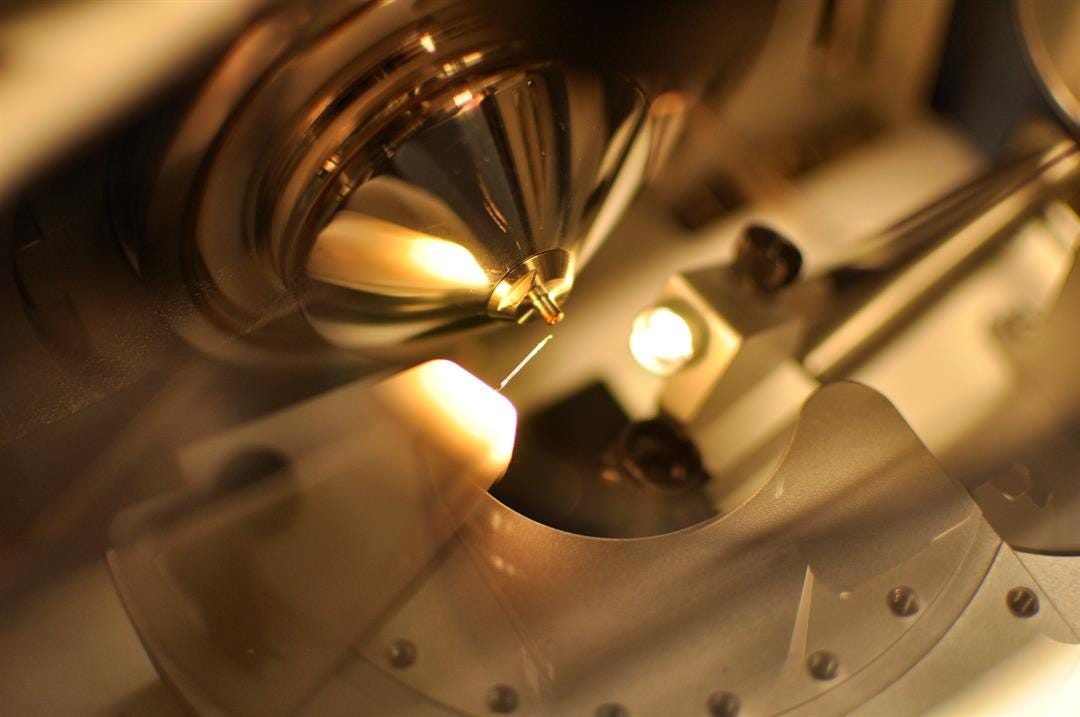Funding Boosts Simple Tests for Parkinson’s, Alzheimer’s
 A liquid sample is sprayed into a mass spectrometer for Tymora analysis.
A liquid sample is sprayed into a mass spectrometer for Tymora analysis.
Subscriber Benefit
As a subscriber you can listen to articles at work, in the car, or while you work out. Subscribe NowParkinson’s disease is a grim diagnosis; it’s typically not detected until a person exhibits the characteristic tremors, when it’s progressed too far to slow the condition. West Lafayette-based Tymora Analytical Operations envisions a routine urine test that would spot Parkinson’s early, when medication and other strategies can slow its progression. The startup has several diseases in its cross-hairs; boosted by recent funding for both Parkinson’s and Alzheimer’s, the company is developing simple urine, saliva and blood tests to detect diseases that are notoriously difficult to diagnose.
Tymora President and Chief Technology Officer Dr. Anton Iliuk says there’s no specific test to diagnose Parkinson’s, so a neurologist relies on physiological assessments and observing symptoms. In some cases, doctors may do a spinal tap or PET scan of the brain, but both are very costly.
“There’s no good way to [diagnose Parkinson’s]; if you’re feeling good, there’s no reason to do a Parkinson’s diagnostic. Nobody will do a spinal tap or brain scan ‘just in case,’ so the majority of people are diagnosed at late stages,” says Iliuk. “Our goal is to be able to find it faster before the symptoms are apparent, but also non-invasively, so you can just do a routine urine test for detection.”
The Michael J. Fox Foundation (MJFF) recently learned about Tymora’s EVtrap technology and invited the startup to apply for funding—a rare occurrence in the world of research funding. The organization quickly awarded the money, although Tymora can’t share the amount publicly.
Hence its name, the company’s technology “traps” nanoparticles called exosomes, or EVs. Every cell releases exosomes to communicate with other cells. When a cell becomes diseased, the exosomes change.
“EVtrap isolates [exosomes] from blood, urine or saliva, which allows us to detect the markers that are inside,” says Iliuk. “Different markers and different exosomes would potentially correlate with different diseases such as Parkinson’s, Alzheimer’s or various cancers. Our goal is to capture these EVs that are floating around all over the body and find useful markers for disease detection.”
Headquartered at the Purdue Research Park, Tymora is based on discoveries made by Purdue University Biochemistry Professor Dr. W. Andy Tao. In addition to the recent dose of funding, MJFF also donated more than 100 samples—some from patients with Parkinson’s and some without—to Tymora to screen for valuable markers of the disease.
“Access to samples is very difficult, but it’s critical in order to get any data or obvious results,” says Iliuk. “We don’t have easy access to clinical samples ourselves, so having a foundation with a well-curated and large number of samples to achieve statistical significance is critical for research like ours.”
Also showing promise is the company’s EVtrap technology focused on using a blood sample to detect Alzheimer’s disease. The National Institute on Aging, a group within the National Institutes of Health, recently awarded Tymora a $225,000 SBIR grant (Small Business Innovation Research) to boost its work in Alzheimer’s. Much like Parkinson’s, earlier detection opens the door for better Alzheimer’s treatments. Tymora’s third leading project is detecting bladder cancer using a urine sample. Iliuk says it’s difficult to predict which platform will “hit” first.
“It depends how promising the biomarkers are that we’re able to identify and the partnerships that we’re able to gain—we don’t expect to be able to commercialize [the tests] ourselves,” says Iliuk. “Sometimes it depends on the opportunity, not necessarily the science.”
The science, however, is opening doors that Iliuk says could revolutionize how patients are screened for certain diseases.
“The reason we have multiple pipelines—projects going on at the same time—is because now, all of a sudden, we have opened this whole new area of research and whole new area of potential noninvasive diagnostics,” says Iliuk. “We’re excited about going through all of them and making an impact in a number of areas.”
Iliuk says the startup is excited about the potential to identify things that have been undetectable and to uncover “a new route for disease diagnostics.”
Iliuk says the next step is validating the markers Tymora has discovered on a larger patient population.

